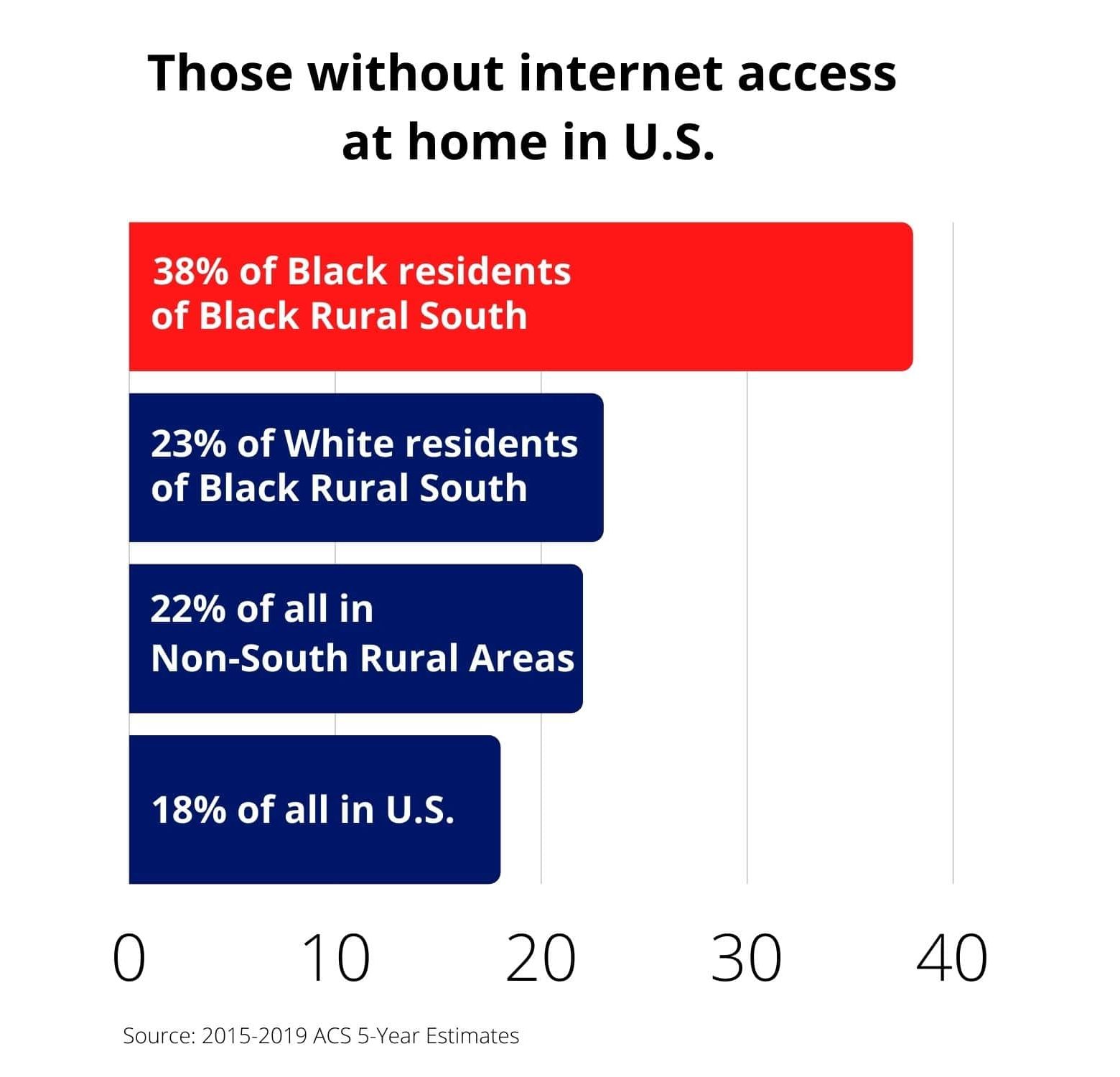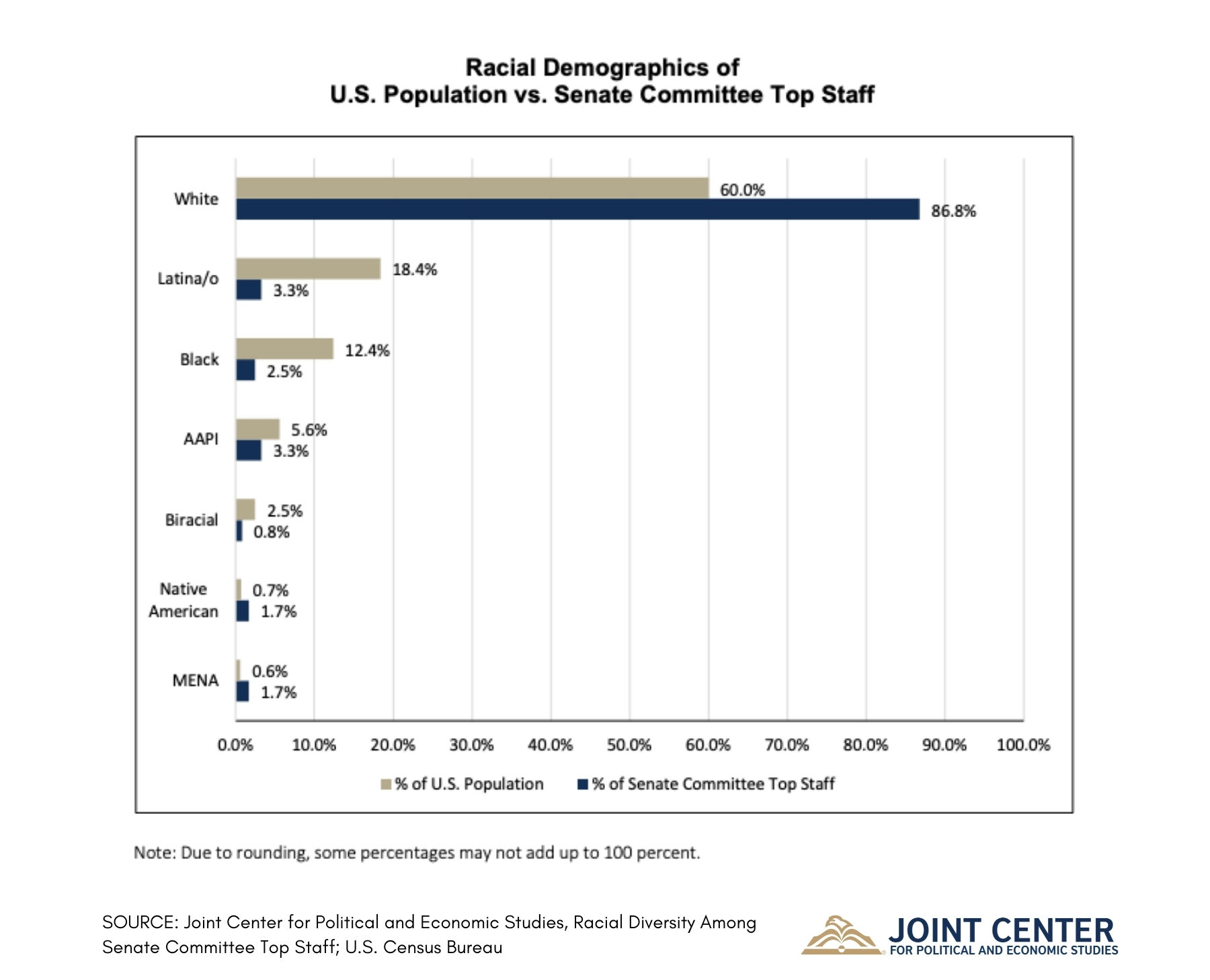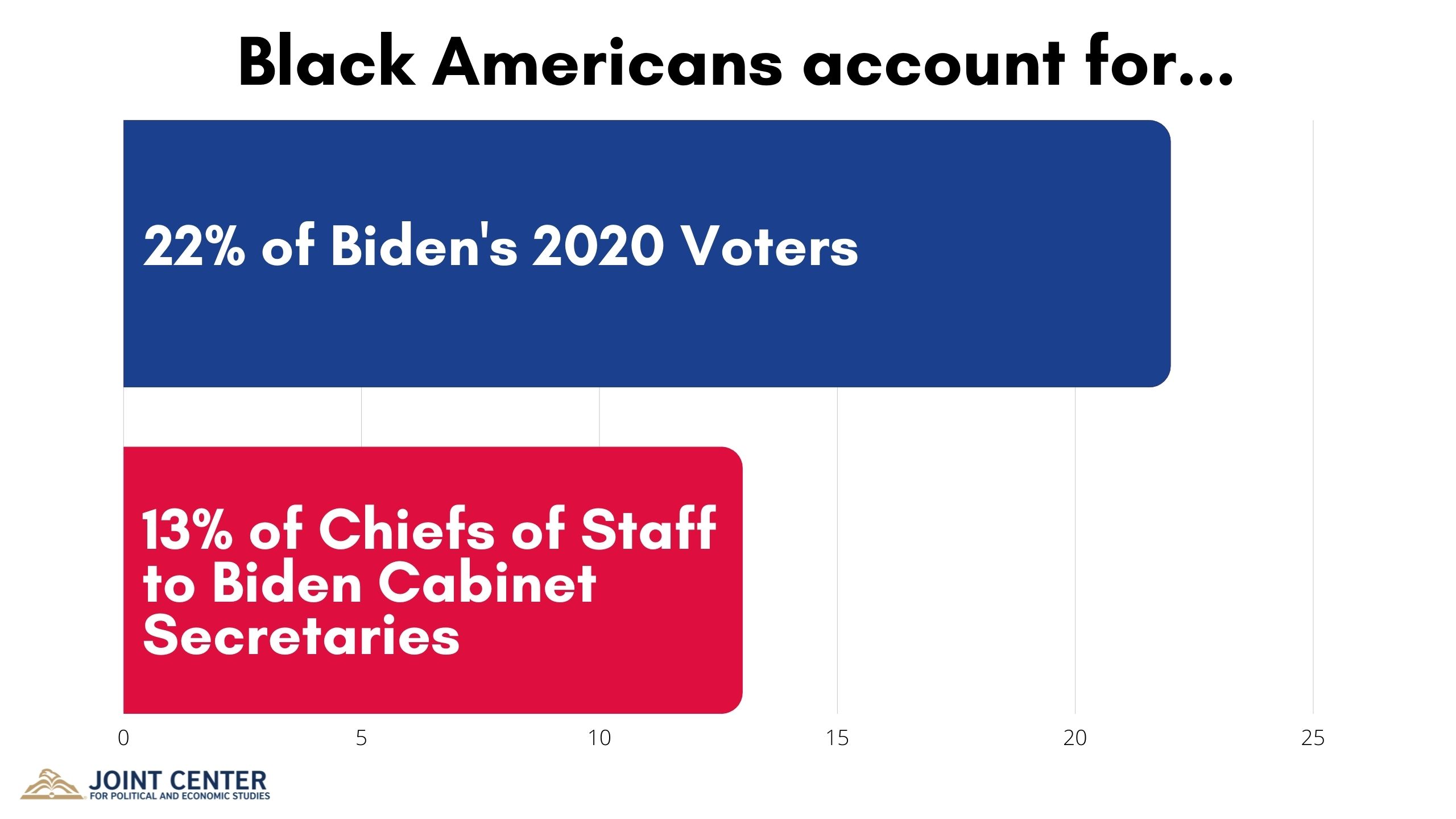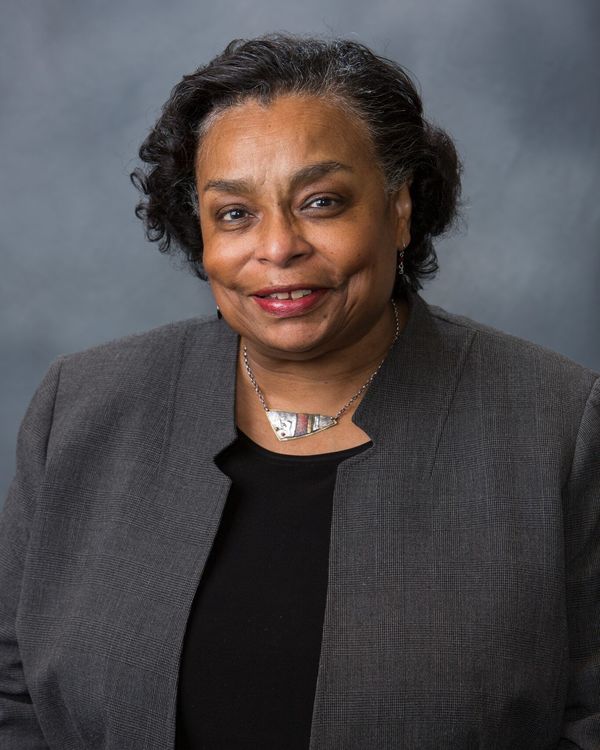Joint Center Updates

Our July 2021 Work: New Research on Top Senate Staff Diversity & Expanding Broadband in the Black Rural South
Economic Studies

Informing the infrastructure debate to ensure expanded broadband in the Black Rural South: As discussions continued on a federal infrastructure package, in early July the Joint Center released this issue brief by Tech Policy Director Dr. Dominique Harrison on expanding broadband in the Black Rural South (152 rural counties with populations that are at least 35% Black). The issue brief revealed that 38% of African Americans in the Black Rural South report that they lack home internet, which is much greater than most other U.S. communities. Dr. Harrison’s original data analysis shows that this challenge stems from both the unavailability and unaffordability of broadband to many in the region, and that expanded broadband could increase employment, incomes, workforce skills, and educational and health care opportunities in the Black Rural South. She also provides recommendations.
In late July, Dr. Harrison organized and moderated a webinar on the challenges of and solutions to expanding broadband in the Black Rural South featuring House Majority Whip James Clyburn and others (below).
On July 28, Republicans and Democrats announced a bipartisan deal that includes many of Dr. Harrison’s recommendations, including a $65 billion investment in broadband infrastructure, provisions to end digital redlining, and creating a “permanent program to help more low-income households access the internet.”

Dr. Harrison continues to talk broadband infrastructure at Microsoft: Dr. Dominique Harrison participated in a Microsoft event on reshaping America’s digital infrastructure, and discussed details from her forthcoming report on broadband in the Black Rural South. Other panelists included Michigan Lt. Gov. Garlin Gilchrist; Angela Siefer, National Digital Inclusion Alliance executive director; and Katie Spiker, director of government affairs at the National Skills Coalition. Portia Wu, Microsoft’s managing director of public policy, U.S. government affairs, moderated the conversation. Watch it here.
Broadband access for telehealth: Dr. Dominique Harrison spoke to Business Insider about the importance of broadband access and affordability, especially as pandemic-era programs led more people to connect and expanded telehealth.
Joint Center supports the JOBS Act: In a LinkedIn Q&A with National Skills Coalition CEO Andy Van Kleunen, Joint Center President Spencer Overton called for Congress to pass the JOBS Act. “For Black workers, access to skills training will be essential to the lifelong learning needed to keep pace with technology’s impact on the workplace,” said Overton. Yet such training could be an empty promise for millions of African Americans without access to more supports, he warned. “Unequal investments in workers’ skills will only exacerbate existing disparities. That’s why expanding the Pell Grant—a form of need-based aid that typically doesn’t require repayment—for lifelong reskilling is essential.”
Short-term training for Black workers: The Joint Center held an invitation-only roundtable discussion on short-term job training. The event brought together the expertise of funders, researchers, organizers, and others interested in amplifying opportunities to strengthen training policies so that they do a better job to improve economic mobility for Black workers. Perspectives from participants will contribute to a set of race-forward principles that federal and state decision-makers should consider for WIOA reauthorization, the American Jobs and Families Plan, and other state and local workforce recovery policies.
Technology and equity: Dr. Alex Camardelle, the Joint Center’s workforce policy director, took part in the Congressional Black Caucus’s TECH2025 Unconference on advancing equity in tech. The event brought together industry leaders, policy experts, government, and nonprofits to crowdsource policy ideas.

Household financial well-being at the Federal Reserve: Dr. Alex Camardelle also served as a panelist for the Federal Reserve Bank of Atlanta’s webinar, “Career Pathways to Household Financial Well-Being.” Other panelists included Dave Altig, the Atlanta Fed’s executive vice president and director of research; Monesia Brown, director of public affairs and government relations at Walmart; Talethia Edwards, Hand Up Project executive director, and Alicia Johnson, Step Up Savannah executive director.
Racial equity in retirement at Aspen: Jessica Fulton, the Joint Center’s vice president, participated in a roundtable on centering racial equity and wealth-building in an inclusive retirement savings system at the 2021 Aspen Leadership Forum on Retirement Savings. The invitation-only convening included key stakeholders from the retirement industry, advocacy, government, and academia to discuss challenges and solutions for retirement security.
Big tech and consumer protection: Dr. Dominique Harrison participated in an American Bar Association’s Antitrust Law Section consumer protection session on the challenges facing digital platforms and technology companies. Other participants included Yelp senior vice president of public policy, Luther Lowe, and Edith Ramirez, partner at Hogan Lovells. Jessica Rich, distinguished fellow at Georgetown University’s Institute for Technology, Law and Policy, moderated the conversation.
Finding the right path to digital transformation: Dr. Dominique Harrison joined a Bay Area Virtual Digital Government summit on using tech to provide citizen services at lower costs and with greater efficiency. Other participants included Bryan Cole, Micro Focus chief technologist; and Rob Silverberg, Dell Technologies’ chief strategy and innovation officer for state and local government. Steve Towns, Republic’s deputy chief content officer, moderated the panel.
Building an inclusive economy: Dr. Dominique Harrison joined a closed session on key financial inclusion policy considerations for technology-centered financial services providers. She discussed how tech-savvy financial services providers can help build an inclusive economy. Other panelists included Courtney K. Robinson, head of financial inclusion and public policy development at Square, and Michael Wong, policy advisor to Sen. Kyrsten Sinema (D-AZ).
Political Studies
 New report: Lack of diversity in Senate top committee positions: The Joint Center released its latest report, Racial Diversity Among Senate Committee Top Staff, documenting a lack of racial diversity among top staff in Senate committee offices. Dr. LaShonda Brenson, senior fellow of diversity and inclusion at the Joint Center, finds that while people of color account for 40 percent of the U.S. population, they make up only 8 percent of Senate staff directors. They also make up only 16 percent of non-staff director top roles, such as deputy staff director or chief counsel. While African Americans account for 12.4 percent of the U.S. population, they make up only 2.6 percent of Senate staff directors and 2.4 percent of other top roles. The report was also covered in Roll Call.
New report: Lack of diversity in Senate top committee positions: The Joint Center released its latest report, Racial Diversity Among Senate Committee Top Staff, documenting a lack of racial diversity among top staff in Senate committee offices. Dr. LaShonda Brenson, senior fellow of diversity and inclusion at the Joint Center, finds that while people of color account for 40 percent of the U.S. population, they make up only 8 percent of Senate staff directors. They also make up only 16 percent of non-staff director top roles, such as deputy staff director or chief counsel. While African Americans account for 12.4 percent of the U.S. population, they make up only 2.6 percent of Senate staff directors and 2.4 percent of other top roles. The report was also covered in Roll Call.
The Hill published an op-ed by Dr. LaShonda Brenson calling for Senate committee chairs and ranking members to hire more diverse top staff: Dr. Brenson writes “[t]o solve this problem, more committee offices should formalize their diversity and inclusion plans, and consistently measure progress and adjust recruiting and retention strategies. Senators should ensure several staff of color are in mid-level positions that feed into top positions. The U.S. Senate should also follow the lead of the U.S. House of Representatives by establishing a bipartisan Office of Diversity and Inclusion to help all Senate offices track progress and improve staff diversity.”
Breaking down the Senate Democrats’ diversity survey: The Joint Center pulled out the key findings from the Senate Democratic Caucus’s 5th annual survey on its’ Members’ staff diversity. The Joint Center’s analysis ranks the three most and least racially diverse offices, and offices with the most Black, Latina/o, Asian American/Pacific Islander, and female staff. In their coverage of the Caucus’s survey, many publications adopted the Joint Center’s framework in organizing the data, including CNN and The Hill.
How well do Democratic Senators who represent large populations of Black residents fare in hiring Black top staff? In a blog post, Dr. LaShonda Brenson examines the hiring patterns of Black staff, especially in senior positions, in Democratic Senate personal offices that represent states with at least a 15 percent African American population. To date, Senate Republican offices have not released staff demographic data.

How diverse are the chiefs of staff to Biden’s cabinet? The Joint Center’s new report card finds that Black Americans account for just 13 percent of all chiefs of staff to cabinet secretaries in the Biden administration. By comparison, Black voters accounted for approximately 22 percent of the president’s votes in the 2020 general election. Chiefs of staff play critical roles in determining the extent of Black appointments within an agency. Roll Call recently covered all three of the Joint Center’s recent report cards on Black representation within the Biden Administration.
A call for more Black Men in top positions: Acknowledging the underrepresentation of both Black women and men, Joint Center board member Paul Thornell co-wrote an op-ed in Barron’s on the ”nearly complete absence of Black men in top policymaking roles in both the administration and the top staff of the U.S. Senate.”
In Case You Missed It
Strengthening our tech policy program: The Joint Center was among the awardees of the Knight Foundation’s $5.5 million investment to study the impact of misinformation on people of color and on democracy at large. Other awardees include the Berkman Klein Center for Internet and Society at Harvard University, and the Lincoln Network. News of the grant was also covered in Forbes.

Congratulations to Dr. Pinderhughes: Joint Center board member Dr. Dianne Pinderhughes will serve as president of the International Political Science Association.

